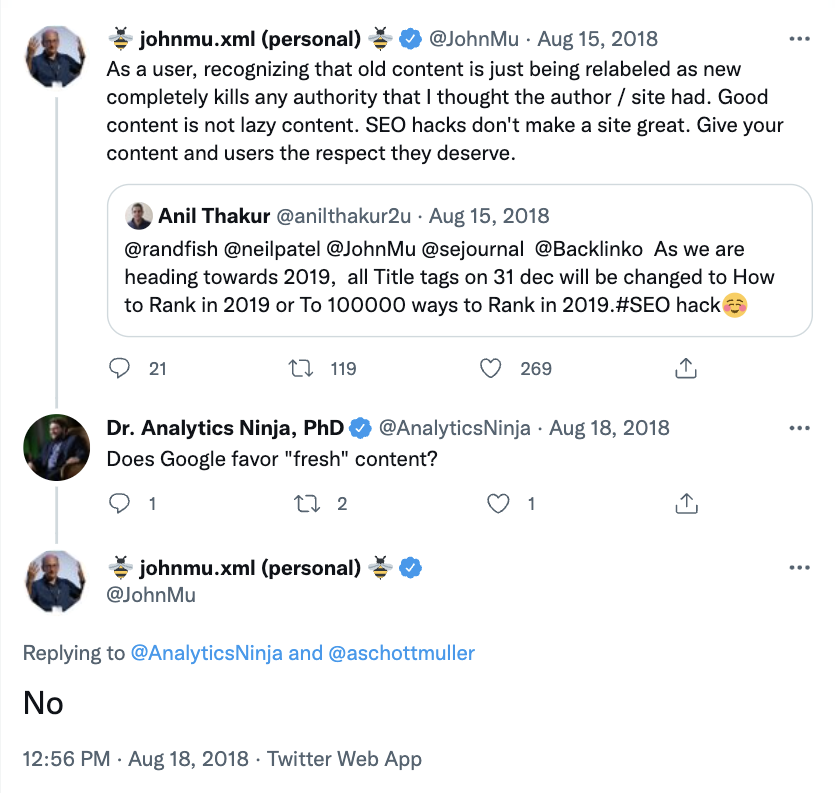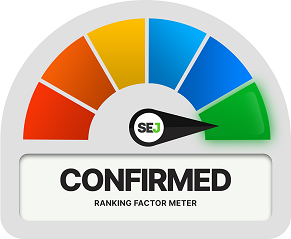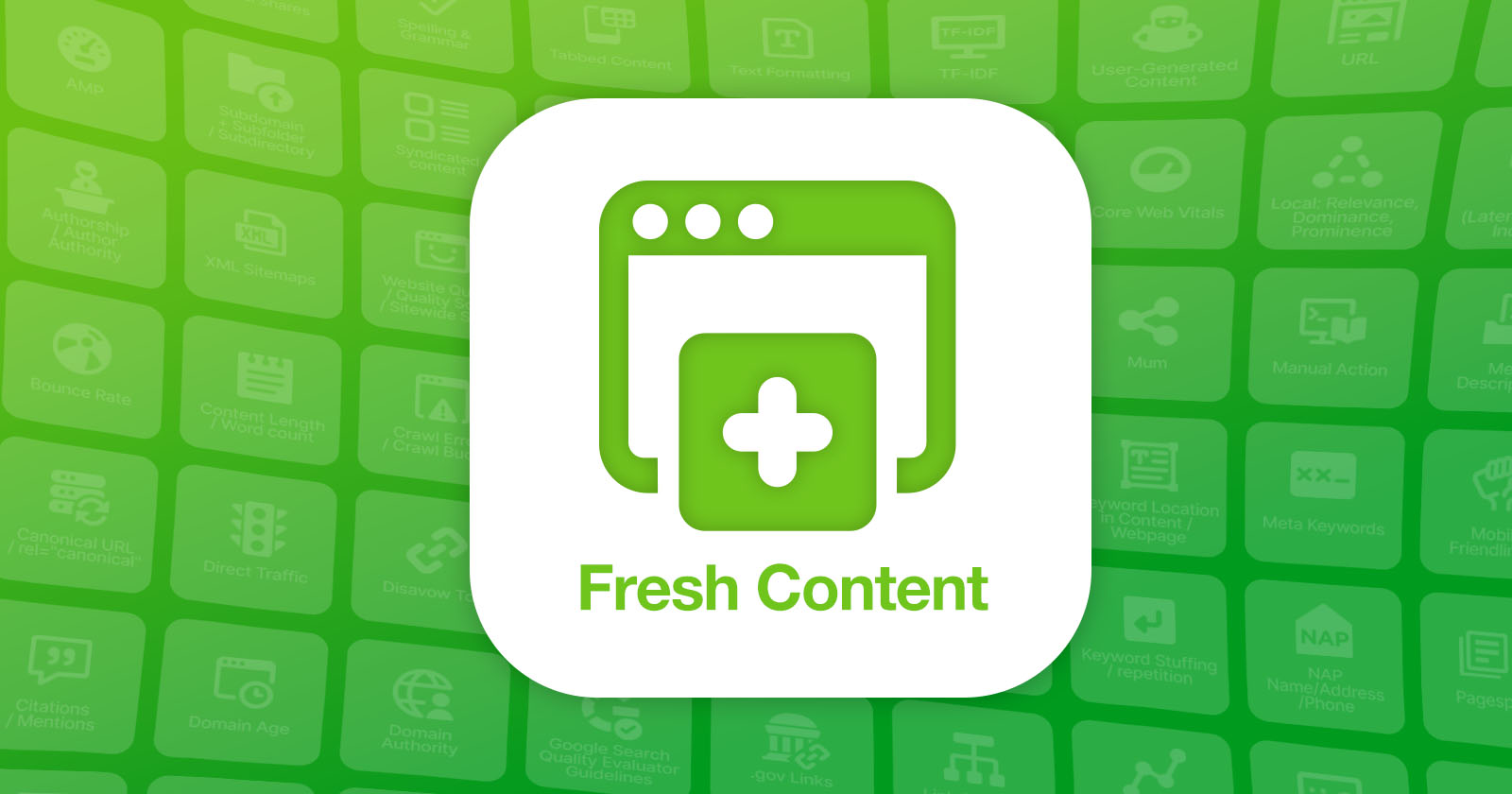As with most updates in Google’s history, search industry rumors spread quickly about how to “game” the system.
“Freshness” is a common theme among Google updates, spanning over a decade.
And “fresh content” as a ranking factor has been an ongoing point of interest for SEOs, especially among content marketers.
To better understand the debate, we will look at Google’s “Freshness” updates, specifically what they mean and how (if at all) they affect search rankings.
[Recommended Read:] Google Ranking Factors: Fact or Fiction
The Claim: Fresh Content As A Ranking Factor
The speculation that fresh content may be a ranking factor began in response to a few major Google updates and has snowballed into quite the claim.
The idea behind “fresh content” started a few years before Google’s Caffeine update.
In 2007, a New York Times reporter was allowed to spend a day with Amit Singhal (Senior VP of Search at the time).
During this time, Singhal spoke on the record about the solution he had developed to solve the “freshness problem.”
It was a new algorithm that tried to determine when users wanted new information and when they didn’t.
And like all Google initiatives, it had a catchy moniker: QDF for “query deserves freshness.”
Caffeine (2009 Google Update)
If you think Google core updates are a big deal now, wait until you hear about the Google Caffeine update of 2009.
It was such a massive change that Google actually provided developers with a preview a few months before rolling it out.
Caffeine allowed Google to crawl faster, thus delivering fresher results from a much larger index.
The indexing update was completed in June 2010, kicking off the fresh content myth because Google said, “Caffeine provides 50 percent fresher results.”
Freshness (2011 Google Update)
Google announced a “Freshness update” in November 2011, four years after the New York Times story broke.
In the announcement titled, “Giving you fresher, more recent search results,” Google explained that this was a significant improvement to the ranking algorithm and noticeably impacts six to 10% of searches.
Featured Snippets Freshness (2019 Google Update)
Freshness updates did not stop there. Relevancy continues to be top of mind for Google as they seek to satisfy user queries.
Pandu Nayak, Google’s current Vice President of Search, announced in 2019 that the company updated its search algorithms to keep snippets current, fresh, and relevant.
Danny Sullivan confirmed that the Featured Snippets Freshness update went live in late February 2019.
Rumors on how to optimize for Google updates spread quickly, and this was undoubtedly true for fresh content.
Speculations circulated claiming that by updating content frequently, you could secure an SEO advantage or that updating the publication date of an article can make it look fresh.
Let’s take a look at the evidence behind these claims and whether fresh content is in any way a ranking factor.
For a deep dive into Google Ranking Factors, download the ebook now.
The Evidence: Fresh Content As A Ranking Factor
To decide if “fresh content” could be a ranking factor, we need to understand two things: what the “Freshness” algorithm updates mean and how they affect search rankings.
QDF
Query deserves freshness (QDF) is very literal.
Google’s solution revolved around determining whether a search query is “hot,” meaning whether or not the user wants the most up-to-date information on the topic.
The mathematical model looked at news sites, blog posts, and Google’s own stream of billions of search queries to see how much global interest there is in a particular subject.
For example, Singhal shared what happens when cities suffer power outages.
“When there is a blackout in New York, the first articles appear in 15 minutes; we get queries in two seconds,” Singhal told the New York Times.
Such a sudden spike in interest can signify that people are looking for new information.
Caffeine
Unfortunately, many people got the Caffeine update wrong.
Caffeine wasn’t a ranking update. The intention behind it wasn’t even to impact rankings. It was a complete rebuild of Google’s indexing system.
Indexing and ranking are two very different things.
Indexing is when Google first looks at your content and adds it to its index. That means it has the potential to be ranked.
Ranking, however, is an entirely different story, with much more complex algorithms behind it.
And while Caffeine focused on indexing, it was the Freshness update that affected Google’s ranking algorithm.
Freshness
The Freshness update was an effort to understand when a user is looking for more recent information.
But “freshness” doesn’t apply across the board to all search queries.
Google shares information on precisely which queries deserve freshness on its How Search Works page.
 Screenshot from Google “How Search Works,” June 2022
Screenshot from Google “How Search Works,” June 2022Google’s Freshness algorithm seeks to provide the latest information for trending keywords that fall under categories such as:
- Recent events or hot topics: celebrity news or natural disasters.
- Regularly recurring events: the Olympics or Sports Scores.
- Content that frequently updates: best/reviews or technology industry.
Freshness is a complex topic in its own right, so it’s a good idea to learn about it if you’re targeting time-focused queries.
Google Representatives On Freshness: Give Users The Respect They Deserve
Do we have an official answer? Yep.
In 2018, John Mueller replied to a question asking, does Google favor fresh content?
 Screenshot from Twitter thread, June 2022
Screenshot from Twitter thread, June 2022Mueller’s “no” reply has to be taken into context with the whole Twitter conversation.
User @anilthakur2u had made a joke about title tags updating on December 31 to become relevant for the upcoming year.
Mueller replied, “SEO hacks don’t make a site great. Give your content and users the respect they deserve.”
Here, here!
Just updating your publication date is a poor SEO strategy and won’t help you rank better.
Want to learn more? Get the complete Google Ranking Factors guide.
Our Verdict: Fresh Content Is A Confirmed Ranking Factor For Some Queries

When the query demands it, fresh content is a Google ranking factor.
Does that mean you should constantly change the publish date? No.
Does it mean an article could outrank other pages because of the date they were published? Potentially, if Google thinks freshness is critical to the user’s query.
Please keep in mind there are a lot of ranking factors, not just “freshness.”
You may be able to win a ranking boost by riding the wave of popular trends, upcoming events, or breaking news, but it is not an evergreen content strategy.
Featured Image: Paulo Bobita/Search Engine Journal





